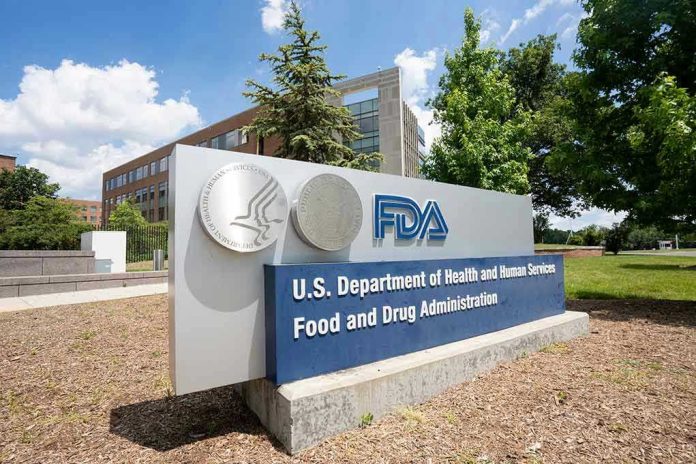
Over half a million bottles of a widely used blood pressure medication have been recalled due to a potentially cancerous impurity.
Story Overview
- The FDA recalls 500,000+ bottles of prazosin hydrochloride due to nitrosamine impurities.
- The impurity, linked to cancer, affects hypertension and PTSD patients.
- Previous incidents highlight ongoing challenges in pharmaceutical manufacturing.
- Short-term disruptions and long-term regulatory implications are expected.
FDA’s Recall of Prazosin Hydrochloride
The FDA has announced a nationwide recall of more than 500,000 bottles of prazosin hydrochloride, a blood pressure medication, due to nitrosamine impurities above safe levels. This recall involves multiple dosages and is classified as a Class II risk, meaning it could cause temporary or medically reversible adverse health consequences. The recall affects capsules set to expire between 2025 and 2026. The impurity, “No-nitroso Prazosin impurity C,” poses a cancer risk, impacting patients taking prazosin for hypertension and PTSD.
Nitrosamine impurities have been a recurring issue in the pharmaceutical industry since 2018, with recalls of medications like valsartan, losartan, and irbesartan. These compounds are classified as probable human carcinogens by the U.S. Environmental Protection Agency. The FDA has been enforcing stricter guidelines for acceptable nitrosamine levels and requiring manufacturers to enhance quality control to prevent such occurrences.
Stakeholders and Their Roles
The recall involves several key stakeholders. The FDA, responsible for overseeing drug safety, has initiated the recall. Teva Pharmaceuticals, the manufacturer, must ensure compliance and manage potential liability. Patients, particularly those with hypertension or PTSD, are directly impacted, needing to find safe alternatives. Healthcare providers play a crucial role in guiding patients through this transition, ensuring patient safety and continuity of care during this time.
The power dynamics in this scenario place the FDA in a regulatory position, compelling manufacturers to adhere to safety directives. Healthcare providers act as intermediaries, communicating the recall and managing patient care. Decision-makers include FDA leadership, Teva Pharmaceuticals’ quality assurance teams, and medical associations providing guidance.
Current Developments and Impacts
The recall, announced in October 2025, covers over 580,000 bottles of prazosin hydrochloride in various dosages. It is voluntary but classified as Class II by the FDA, indicating moderate risk. While no adverse events have been directly linked to the impurity, the recall continues, with affected products being removed from shelves. Patients are advised not to abruptly stop the medication but to consult healthcare providers for alternatives.
The recall disrupts medication supply for patients and increases healthcare providers’ workload. Long-term implications include heightened scrutiny of pharmaceutical manufacturing and potential reforms in regulatory standards. Economically, Teva Pharmaceuticals faces costs associated with recall logistics, potential litigation, and lost sales. Socially, patient anxiety and trust issues regarding medication safety could rise, while politically, regulatory agencies may face pressure for stricter oversight.
Expert Opinions and Analysis
Experts stress the importance of consulting healthcare providers before making any changes to medication regimens. Regulatory and pharmaceutical experts highlight ongoing challenges in controlling nitrosamine impurities and emphasize the need for improvements in manufacturing processes. Academic sources note that nitrosamines have well-documented carcinogenic potential, making their presence in medications a significant public health concern.
Some experts argue that while the risk from short-term exposure is low, cumulative exposure justifies the recall. Patient advocacy groups emphasize clear communication to prevent unnecessary panic. The FDA and NIH are considered authoritative sources for drug safety, and their announcements validate the recall’s rationale.

